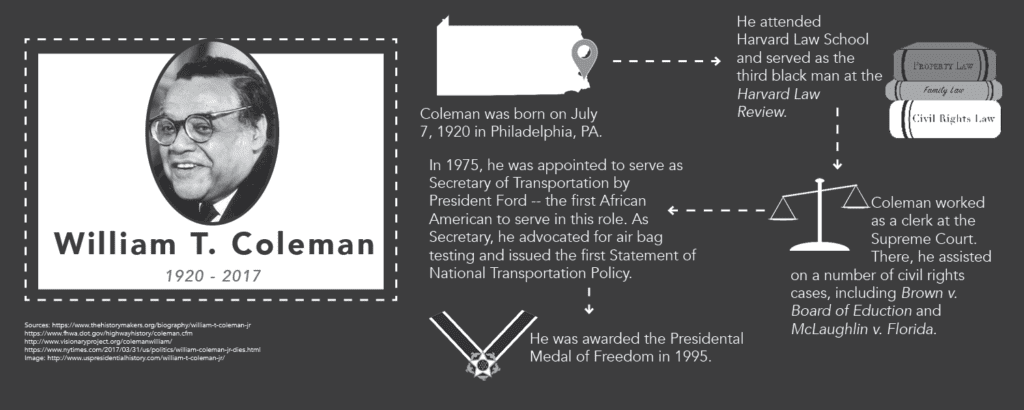
William Thaddeus Coleman had a remarkable career dedicated to public service. Born on July 7, 1920, Coleman spent his childhood in Philadelphia, Pennsylvania. After graduating from the University of Pennsylvania, Coleman attended Harvard Law School where he served as the third African American man on the board of editors at the Harvard Law Review.
After graduation, Coleman worked tirelessly for civil rights. He became the first black man to clerk for the Supreme Court just one year post-graduation. While at the Supreme Court, in 1949, Coleman began to work with Thurgood Marshall on NAACP cases. He wrote opinions, served as co-council and otherwise assisted on a number of landmark cases, including Brown v. Board of Education, which led to the desegregation of schools,and McLaughlin v. Florida, which ruled that laws prohibiting interracial marriage were unconstitutional.
Over the next two decades, Coleman continued to practice law and fight for civil rights, eventually becoming the president of the NAACP Legal Defense and Education Fund in 1971.
Shortly thereafter, in 1975, he was appointed by President Gerald Ford to be the Secretary of Transportation – the first African American to serve in that role, and the second to hold a cabinet-level position. As in his legal career, in this role Coleman pushed the boundaries for social advancement and safety. While secretary, he issued the first Statement of National Transportation Policy. He made strides to improve road and air safety, including announcing two years of air bag testing for cars in 1976, though they were not standard in cars until the 1990s.
For his remarkable accomplishments, Coleman was awarded the Presidential Medal of Freedom in 1995.
Sources:
https://www.thehistorymakers.org/biography/william-t-coleman-jr
https://www.fhwa.dot.gov/highwayhistory/coleman.cfm
http://www.visionaryproject.org/colemanwilliam/


